Doug Jones says farmers scared by Donald Trump’s tariffs
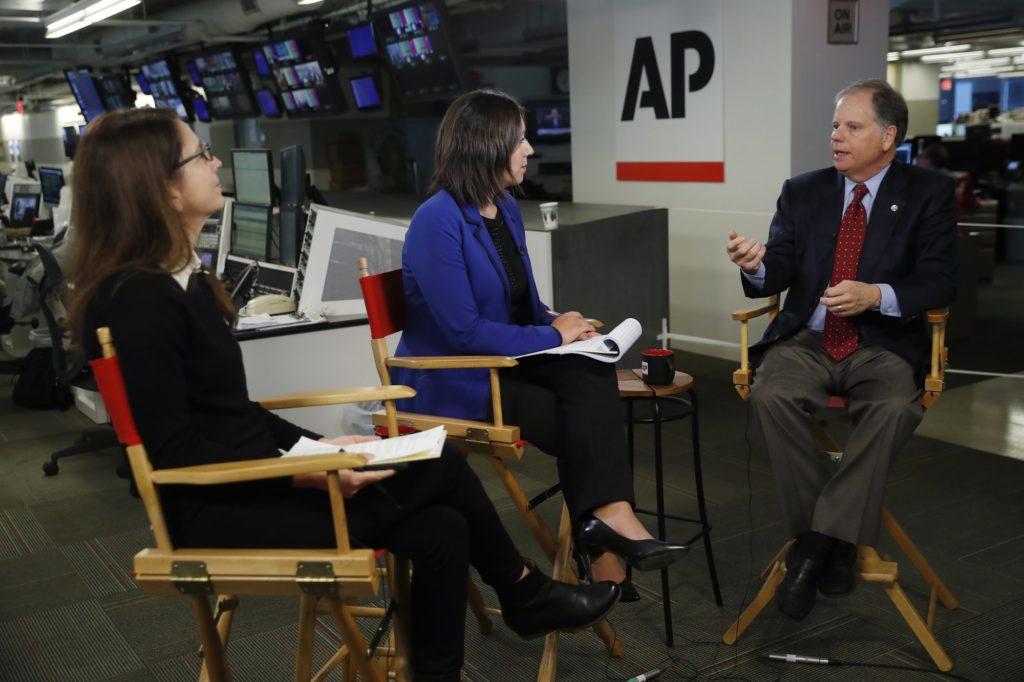
Democratic Sen. Doug Jones says President Donald Trump’s talk of tariffs is sparking questions and anxiety back home in Alabama, including from soybean farmers who are “scared to death.” Jones said Wednesday in an Associated Press interview that even in deep-red Alabama people are starting to question whether Trump’s “nationalistic approach” on tariffs is a threat to their financial well-being. He said: “My soybean farmers are scared to death because they’re losing markets left and right. They’ve spent so much time building up markets in China and abroad” that are now uncertain because of Trump’s approach. Jones said Alabama’s auto exporters are also concerned. Trump calls himself the “tariff man” and wants to hike more such taxes on foreign entities that do business in the U.S. Republished with permission from the Associated Press.
Bradley Byrne: Our farmers are our future
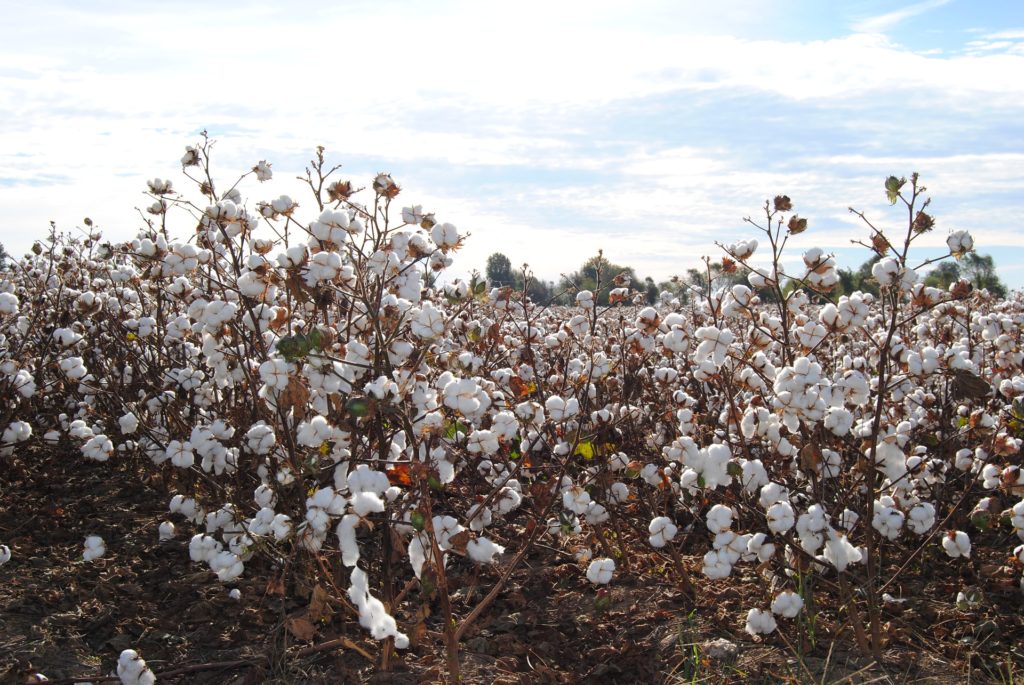
This past week, I had the pleasure of visiting many fine farmers and foresters throughout Southwest Alabama to learn more about the incredible work they do on a daily basis. This was part of my annual “Ag Matters” agricultural tour, which brings me to farms and forests in each of the six counties that make up Alabama’s First Congressional District. Forestry in Alabama first began in Clarke County, and that is where I began my tour. I was pleased to learn more about how the people at Canfor Southern Pine carry on the forestry tradition to this day. Not only are they the largest employer in Jackson, Canfor produces high-quality lumber products that are used all throughout the Eastern United States. At this mill alone, they produce around 110 million board feet per year in lumber products. To produce this much material, they rely on the sustainable harvesting of private timberlands throughout our region. I had a chance to tour some of these private timberlands and learn more about ways owners are working with the Fish and Wildlife Service to protect endangered and threatened species. It is important that we find solutions that work for both our environment and for those trying to make a living through sustainable practices. Animals such as the gopher tortoise and the black pine snake are threatened in certain areas of Alabama. Timberland owners and workers want to protect our environment, as a healthy environment is critical to their future. But, they should not be unduly limited by the government in the work they do. I was able to talk with several foresters from all around Southwest Alabama at a forestry roundtable hosted at a local branch of Alabama Ag Credit. The people at Ag Credit also know that our farmers and foresters are our future and believe in providing them with sound financial options through responsible lending and thorough financial counseling. As I continued my tour, I saw some excellent examples of topiary management at a garden nursery in Mobile, learned about the bumper crop of cotton this year at farms in Escambia and Baldwin counties, and was informed of the status of this year’s peanut harvest. This past year, I was one of the leading advocates to get cotton back in Title I of the Disaster Package to provide further assistance and recovery options for farmers adversely affected by unforeseen natural circumstances. One of the biggest takeaways from my tour this year was just how fortunate we are that we were not more directly impacted by Hurricane Michael. I’m dedicated to working with Representative Martha Roby on continued recovery efforts for farmers in the Wiregrass and throughout South Alabama. We need to make sure they receive the necessary federal and state assistance they deserve to get through these unexpected and difficult times. One thing is certain: as we enter the final legislative session of this year, we must reauthorize the Farm Bill. The Farm Bill will provide greater protections for the cotton and peanut growers in our area and for other farmers and foresters throughout Alabama and the nation. Without the tireless efforts of producers all across the nation, life as we know it would not exist. From providing the food we eat, to the raw materials for the clothes we wear, to the foundational building elements all around us, our farmers and foresters impact our daily lives in truly tangible ways. We owe it to them to fight for more protections to help create a stronger future for all of Alabama, and we must always remember that our farmers are our future. ••• Bradley Byrne is a member of U.S. Congress representing Alabama’s 1st Congressional District.
Donald Trump’s tariffs could sow trouble for GOP in farm districts

In the aptly named Harvester Restaurant, wheat farmer Roy Dube makes clear he’s no fan of President Donald Trump‘s trade policy. “We get him elected into office and he pulls us out of trade agreements,” Dube said last week as local farmers gathered to hear Democratic House candidate Lisa Brown. Dube says China is buying less wheat from eastern Washington farmers and Trump’s policies have opened the door for Australia and Canada to wrestle away business. His frustration extends to his congressional representative, Rep. Cathy McMorris Rodgers, who is the highest-ranking Republican woman in the House and running for an eighth term. “I’m concerned that Cathy McMorris Rodgers didn’t put up more resistance,” Dube said. The U.S. tariffs on agriculture products, sown by Trump, have grown into an election-year threat to Republicans in rural districts that are heavily reliant on exports for their economy. With the livelihoods of farmers at risk, opposition to the tariffs could make a difference in some races and help determine which party takes control of Congress. McMorris Rodgers has made it clear she opposes the president’s actions on tariffs, but so far, the Republican-controlled House has not taken up legislation to block them. Democrats characterize GOP lawmakers as unable or unwilling to check Trump, who has declared that “tariffs are the greatest.” “My opponent, though she would say she’s concerned and talking to the administration about these issues, she’s still mostly a cheerleader for the president,” said Brown, a former state legislator. Facing what appears to be the tightest re-election race of her career, McMorris Rodgers is emphasizing that she has encouraged the president to “move from tariffs to agreement.” “I have made it very clear that I don’t support the across-the-board tariffs, that we should take a more targeted approach,” McMorris Rodgers told The Associated Press. Clues that the president’s trade policies will play a role in the November midterm elections can be seen in Agriculture Secretary Sonny Perdue‘s travel schedule. Over the past few months, he’s been to Eastern Washington to join McMorris Rodgers in meeting with farmers. He’s also been to California’s Central Valley to meet with farmers in the districts of Republican Reps. Jeff Denham and David Valadao. He also went to Iowa, where Republican Reps. David Young and Rod Blum are both in close races. The battle for the Senate could also be affected by the tariff issue, particularly in North Dakota, Indiana and Missouri, where Republicans hope to knock off three Democratic incumbents. The president has tried to allay farmers’ concerns with an aid package of up to $12 billion to help them weather the trade war. J. Read Smith, a rancher near St. John, Washington, said he shares Trump’s goal of seeking a level playing field in trade. “But antagonizing our trading partners is not the way to do it,” said Smith, who emphasized that he is not a Democrat. “I’m an American.” Aaron Flansburg, who runs a diversified farm near Pullman, Washington, said he’s skeptical the tariffs will change the way most farmers vote, though. “Farmers often vote for Republicans,” Flansburg said. “Whether that will change, I have my doubts.” McMorris Rodgers said it’s her sense that voters are willing to give the president time to negotiate better agreements. “Yes, there’s a lot of uncertainty. There’s a sense that we need to get these trade agreements into place as soon as possible, but there’s also a recognition that for too long America has not taken action, especially against China,” she said. In July, the United States began imposing a tax on $34 billion in Chinese imports. Last month, it added tariffs to $16 billion in Chinese goods and is readying taxes on an additional $200 billion worth. China retaliated with its own tariffs on U.S. products. The world’s two biggest economies are clashing over allegations that China steals technology from American companies. The Trump administration also announced that it will begin taxing $200 billion in Chinese goods starting Monday. The tariffs will start at 10 percent and rise to 25 percent in 2019. The Trump administration also imposed a 25 percent tariff on imported steel and a 10 percent tariff on imported aluminum that included imports from the European Union, Canada and Mexico — and just about everyone else — in the name of national security. Those tariffs also drew retaliation. For example, the EU targeted bourbon, a key industry in Senate Majority Leader Mitch McConnell‘s home state of Kentucky, where Republican Rep. Andy Barr and Democratic challenger Amy McGrath are battling in a close election. Overall, about 6 in 10 Americans disapprove of how the president is handling trade negotiations with other countries. Farm groups have testified in congressional hearings that retaliatory tariffs increase the cost of their products for customers abroad, giving foreign competitors an edge. “The current tariffs, continuing back-and-forth retaliatory actions and trade uncertainties are hitting American agriculture from all sides and are causing us to lose our markets. Once you lose a market, it is really tough to get it back,” said Kevin Paap, president of the Minnesota Farm Bureau. Rep. Ben Ray Lujan, who is overseeing Democratic efforts in House races, pointed to Iowa as a state where he believes the administration’s tariffs could backfire. He said primary turnout was up, in part because small family farmers and the businesses they buy from are worried. “I really believe that in those districts, you’ll see people come forward and hold everyone accountable not standing up for them,” Lujan said. GOP lawmakers from Iowa, including Young and Blum, signed onto a letter calling on the president to act quickly to save rural economies. Blum also wrote Trump separately urging him to “consider the consequences tariffs have on American manufacturers.” When the president visited Blum’s district a few days later, he thanked him for his “political courage” on trade. “You’ve taken some heat for it in the short term, but in the long run, the farmers, the manufacturers, the employers are all going
Martha Roby: Finalizing the Farm Bill

The farm bill is a critically important piece of legislation that sets agriculture policy in our country for about five years at a time, meaning every five years or so, it is Congress’ responsibility to craft and then ultimately pass a new – and hopefully improved – version to provide our farmers with the certainty they need. As you may know, over the summer, the House and Senate both passed our versions of the new farm bill, and I was proud to support our bill in the House. Now, it is up to select members of the House and Senate to conference and work out the differences between our two pieces of legislation. I am glad to report that this process is underway, and I’m hopeful the Conference Committee will agree on a final product soon, as the September 30th deadline for the expiration of the current law is quickly approaching. In Alabama’s Second District, agriculture is the largest employer, so we fully understand how very important it is that Congress get this policy right. Agriculture legislation doesn’t just affect the farmer who puts the seed in the ground. We’re also affecting the ones who sell the seed, who build the equipment to cultivate and harvest the crop, and those who help process the goods to their final products. In Congress, I consider it one of my top responsibilities to be a strong voice for our farmers and to represent their concerns. That’s why I’m pleased that in the House, our version of the farm bill addresses many of the issues that the hardworking farmers in AL-02 have told me they face, including reducing regulatory burdens, addressing invasive species like feral hogs, maintaining the crop insurance program, and more. In addition to these important priorities, the House’s version of the farm bill authorizes substantial funding for rural broadband and implements strict work requirements for food stamp recipients. Since the Senate is currently bound by a 60-vote threshold to pass legislation, their farm bill is quite different than our version in the House. That said, the final farm bill that ultimately comes out of the Conference Committee will very likely be a combination of both versions. No matter what differences exist between the two chambers, Alabama’s farmers and producers deserve a strong, consistent, improved, and on-time farm bill to plan for the future. I will remain actively engaged with my colleagues on the Conference Committee to deliver agriculture policy that gives fair treatment to our Alabama commodities, like cotton, peanuts, timber, poultry, soybeans, and catfish. We’ve come too far to not get this done. Our farmers produce the food and fiber that we all depend on, and it is our responsibility to move forward with strong, commonsense policy that enables them to do their jobs. I am looking forward to sending the final farm bill to the President’s desk, and I will keep you informed on developments. ••• Martha Roby represents Alabama’s Second Congressional District. She lives in Montgomery, Alabama, with her husband Riley and their two children.
Steve Flowers: Beth Chapman – on rane plane ride?

Recently, I wrote about ALFA‘s influence in Alabama politics. In my August 8 column, I said, the Alabama Farmers Federation still controls the Legislature. They use to play in the Governor’s Race. However, they got burned badly by Bob Riley when they helped him get elected and the first thing he did was stab them in the back. However, they have slipped around this year and will not only own the Legislature, they will probably have a good friend in the Governor’s office. The day before the Primary, Kay Ivey was put on Jimmy Ranes’ jet to fly around the state. Boarding with her was Beth Chapman, Alfa’s political consultant. The next night when she came off the platform after giving her appreciation speech, guess who was helping her off the stage and holding her arm so that she would not fall? Jimmy Parnell the Farmers Federation President. Well, I get a note from Debbee Hancock, an Ivey campaign spokesperson, yes, that is right, it is spelled Debbee. She informed me that Beth Chapman was not actually on-board Jimmy Ranes’ plane that day when they flew Kay around the state. I politely told her that in watching the television footage, it looked to me like Beth was in a finite group of people walking beside Kay to the plane. Even Brent Buchanan, the Governor’s campaign manager, concurred with my assessment. He told me, “I was there with Beth and saw it on TV after. I totally see how you could have thought she was headed to the plane when the Governor exited that way.” I told young Debbee that I would clarify that Beth did not actually board the plane, it just looked like she did. However, I told them that they should not be so sensitive about or ashamed of the Farmers’ friendship. Also told them that they should have given them a place on the plane. Most people assume that the Farmers’ would be for the Republican nominee for governor. However, Debbee did not dispute the second part of my August 8 comments where I said that Jimmy Parnell, like the gentleman that he is, was helping Kay off the stage the next night. I advised both Debbee and Brent that they really should not allow her to go out alone and be expected to maneuver stage steps. Recently, one of Kay’s people called me and told me I said Kay was senile. I told them that was a blasphemous lie. I said, “She just looked senile.”I appear on numerous radio talk shows and television stations around the state. I am getting up in age and sometimes I do not remember everything I say. I obviously have become quite uninhibited in my observations and ramblings. Walt Maddox has been doing his best to coax Kay’s folks into letting her debate. Folks, you can bet your bottom dollar, Kay Ivey ain’t going to debate Walt Maddox. My observation is that Kay cannot debate. I do not believe that she has the stamina to physically stand up for an hour or two, much less answer questions. It would be political suicide for her handlers to put her in that trap. She would become befuddled and anxious. She would be prone to putting on a show worse than Big Jim Folsom’s appearance on TV in 1962. It would be a good show. All Kay has to do is run out the clock. She needs to continue to say nothing or do nothing. A Republican Governor who looks elderly and has done nothing wrong ethically and who is enjoying the fruits of a great national recovery will beat a young, energetic, highly qualified candidate who is cognizant and well versed on the issues every day of the week and twice on Sunday in Alabama politics. Just the appearance on a debate stage would be dramatic. Alabamians do not care about a gubernatorial debate or for that matter they do not care much about who is governor. What they do care about is college football and it starts next week. It will occupy Alabamians for the next three months. The Governor’s Race will slide under the radar screen. See you next week. ••• Steve Flowers is Alabama’s leading political columnist. His weekly column appears in over 60 Alabama newspapers. He served 16 years in the state legislature. Steve may be reached at www.steveflowers.us.
Donald Trump’s $12 billion bailout for farmers draws mixed reactions in Alabama
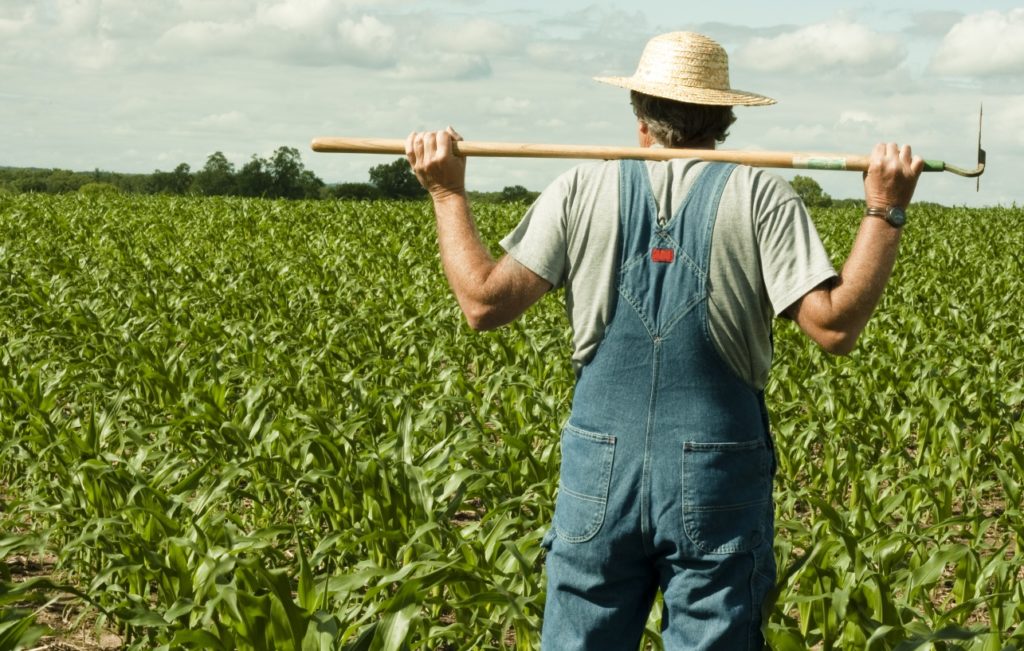
On Tuesday the Trump administration announced it would extend $12 billion in emergency aid to American farmers impacted by tariffs imposed by China on American farm goods. In Alabama, the announcement drew a mix of reactions. The decision for aid came after China imposed a 25 percent retaliatory tariff last week on several crops Alabama farmers export like soybeans and cotton. The aid programs will assist agricultural producers to meet the costs of disrupted markets through market facilitation, food purchase and distribution, and trade promotion. Agriculture Secretary Sonny Perdue announced the aid in a call to reporters, saying the programs “are a firm statement that other nations cannot bully our agricultural producers to force the United States to cave in.” Here’s what Alabamians are saying: Alabama 4th District U.S. Rep. Robert Aderholt: President Trump and Secretary Perdue took action to stand by farmers who are suffering from illegal trade retaliation. Secretary Perdue called me earlier Tuesday to discuss these measures. The actions and funding announced, demonstrate that the President has not forgotten the American farmer and that agricultural producers will not bear the brunt of unjustified retaliation by foreign governments. As Chairman of the Agriculture Subcommittee of the House Appropriations Committee, I have worked to ensure that protective measures and funding would be available should our nation’s agriculture producers be confronted with such abusive policies enacted by foreign leaders. Any funds spent will be temporary. This will ensure that our farmers are able to make ends meet while the Trump Administration works out more fair deals for farmers, ranchers, and producers who want to sell their products overseas. I applaud President Trump for standing-up to China and other foreign government’s unfair trade practices. If our markets here are open to their goods then their markets should be open for American agriculture and manufacturing. Mallory Hagan | Democratic Candidate for Alabama’s 3rd U.S. Congressional District Nearly every farm in Alabama is a family farm. Farm families need confidence to know they can get their products to market so they can put food on the table. Thanks to the whiplash of Donald Trump’s rollercoaster trade war, they don’t have confidence they can make ends meet right now. This $12 billion ‘band-aide’ addresses a problem we can fix for free – unnecessary tariffs blocking American farmers and manufacturers out of markets around the world. Taxpayers should never foot the bill for unsustainable policies. In their silence and failure to act, Congress and Rep. Mike Rogers are supporting bad trade policy and government bailouts along the way. That’s irresponsible and unacceptable. Rogers’ complicity in this insane trade war is hurting Alabama families and killing jobs. It’s time to put the brakes on this administration’s trade disaster. Getting out Uncle Sam’s credit card is not the solution. Alabama Farmer’s Federation: We appreciate President Trump’s administration recognizing the impact intense trade negotiations are having on U.S. farmers and providing assistance to weather tough economic times,’ said Walker, the Federation’s director of national programs. ‘Alabama farmers remain hopeful the ultimate solution will be a healthy trade environment where U.S. agriculture can compete on a level playing field with the rest of the world. Doug Jones | U.S. Senator (via Twitter) Many of your tariffs are not the greatest—they’re the worst. Your auto tariff/tax threatens 57k AL jobs & $11B in exports. Retaliatory tariffs/taxes threaten $170M in AL soybean exports 2 China annually. Your tariffs/taxes are great for 1 thing: killing US jobs. John McMillan | Alabama Commissioner of Agriculture and Industries These three programs will allow the administration to continue to work on long-term trade deals. The end goal is to have an even playing field for our country’s producers.
Fearing a worker shortage, farmers push back on immigration
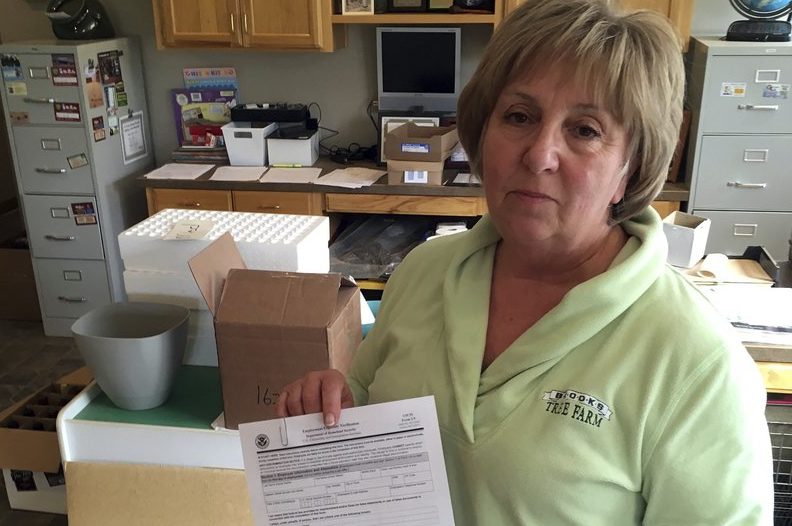
The head of Bethel Heights Vineyard looked out over the 100 acres of vines her crew of 20 Mexicans had just finished pruning, worried about what will happen if the Trump administration presses ahead with its crackdown on immigrants. From tending the plants to harvesting the grapes, it takes skill and a strong work ethic to produce the winery’s pinot noir and chardonnay, and native-born Americans just aren’t willing to work that hard, Patricia Dudley said as a cold rain drenched the vineyard in the hills of Oregon. “Who’s going to come out here and do this work when they deport them all?” she asked. President Donald Trump‘s hard line against immigrants in the U.S. illegally has sent a chill through the nation’s agricultural industry, which fears a crackdown will deprive it of the labor it needs to plant, grow and pick the crops that feed the country. Fruit and vegetable growers, dairy and cattle farmers and owners of plant nurseries and vineyards have begun lobbying politicians at home and in Washington to get them to deal with immigration in a way that minimizes the harm to their livelihoods. Some of the farm leaders are Republicans who voted for Trump and are torn, wanting border security but also mercy toward laborers who are not dangerous criminals. Farming uses a higher percentage of illegal labor than any other U.S. industry, according to a Pew Research Center study. Immigrants working illegally in this country accounted for about 46 percent of America’s roughly 800,000 crop farmworkers in recent years, according to an Associated Press analysis of data from the U.S. Departments of Labor and Agriculture. Stepped-up deportations could carry “significant economic implications,” a 2012 U.S. Department of Agriculture study said. If America’s unauthorized labor force shrank 40 percent, for example, vegetable production could drop by more than 4 percent, the study said. The American Farm Bureau Federation says strict immigration enforcement would raise food prices 5 to 6 percent because of a drop in supply and because of the higher labor costs farmers could face. In addition to proposing a wall at the Mexican border, Trump wants to hire 10,000 more Immigration and Customs Enforcement officers and has served notice that he intends to be more aggressive than the Obama administration in deporting immigrants. ICE agents have arrested hundreds of immigrants since Trump took office, though how much of a change from the Obama administration that represents is a matter of debate. Field hands have been among those targeted, with apple pickers detained in upstate New York and Guatemalans pulled over in Oregon on their way to a forest to pick a plant used in floral arrangements. It doesn’t appear the arrests themselves have put a sizable dent in the agricultural workforce yet, but the fear is taking its toll. Some workers in Oregon are leaving for job sites as early as 1 a.m. and staying away from check-cashing shops on payday to avoid dragnets. Farm employers are worried about losing their workforces. “They say, ‘Don’t go out, don’t get drunk, don’t do nothing illegal’ because they need us too. They worry too,” said Moses Maldonado, who is in the U.S. illegally and has worked for nearly four decades tending wine grapes and picking fruit in Oregon. In Los Banos, California, asparagus farmer Joe Del Bosque said workers are so afraid of being arrested in the field that he struggled to find enough hands in March to pick his crop. When immigration attorney Sarah Loftin held a recent seminar in the Oregon wine-region town of Newberg to talk about immigrants’ legal rights, she was surprised to see that about half those present were winery owners or farmers. By law, job seekers must provide documents establishing their eligibility to work in the U.S. But the papers are often fake. Many agricultural employers say that it’s not their responsibility — and that they lack the expertise — to determine if they’re genuine. At the same time, they say that U.S.-born workers have little interest at laboring in the dirt and the cold at the crack of dawn. As 18 Guatemalans in hoodies and rubber boots toiled in such conditions recently in Oregon’s Willamette Valley, their boss expressed admiration for their willingness to do the back-breaking work he said native-born Americans won’t do. “Homeless people are camped in the fir forest over there,” the farmer said, pointing to a stand of trees. “And they’re not looking for work.” He lamented that crackdowns may force him to retire because he won’t be able to find workers. Fearing reprisals from federal agents, he spoke on condition of anonymity and didn’t want even his crop identified. Some immigration hardliners say people who are in the U.S. illegally steal jobs from Americans. But a 2013 study by an economist at the Center for Global Development looked at farms in North Carolina and found that immigrant manual laborers had “almost zero” effect on the job prospects of native-born U.S. workers. “It appears that almost all U.S. workers prefer almost any labor-market outcome — including long periods of unemployment — to carrying out manual harvest and planting labor,” Michael Clemens wrote. While lobbying for visa and immigration reforms, agricultural employers are also looking into contingency plans such as mechanization or a switch to less labor-intensive crops. In Vermont, officials are considering a vocational program to train inmates in dairy farming. Dudley, the vineyard owner, isn’t optimistic about some of the alternatives. “I don’t trust that temps off the street, or jailhouse labor, or whatever alternative they come up with would work,” she said. Republished with permission of The Associated Press.
Mike Rogers: Helping East Alabama’s farmers

As Alabama’s only member on the House Agriculture Committee, I take my role in protecting our farmer’s best interests very seriously. Alabama’s agricultural industry has quite a large impact on our state economy. Agriculture provides over 580,000 jobs in the state of Alabama, and agriculture and related industries bring in over $70 billion dollars to our great state. Just this week, I had the honor of hosting folks from the Alabama Farmers Federation (ALFA) here in Washington, DC. It’s always good to hear from farmers what programs are working for them and what issues are most important to them. Under President Barack Obama, farmers were under assault from overregulation from the EPA and USDA. President Donald Trump has already kept his promise to cut unnecessary government red tape by signing his disapproval of the Waters of the United States rule. This rule was one of the worst examples of bureaucratic overreach by Obama’s EPA. One issue on the front of the minds of everyone in the Agriculture Committee and farmers alike is the upcoming Farm Bill. The Farm Bill authorizes into law all farm programs for five years, and the current one expires in 2018. The House Agriculture Committee has started hearing from the agriculture industry about what programs in the Farm Bill work for them, and most importantly, what programs do not work for them. As these hearings continue, I remain dedicated to protecting and providing for East Alabama’s farmers. Everyone’s lives are impacted by America’s farmers, and it’s important we provide farmers with the tools they need to remain strong and successful. I want to hear from you. Please sign up for my e-Newsletter by visiting www.mikerogers.house.gov. ••• Mike Rogers is a member of U.S. Congress representing Alabama’s 3rd Congressional District.
Martha Roby: Latest Cabinet picks encouraging for veterans, farmers
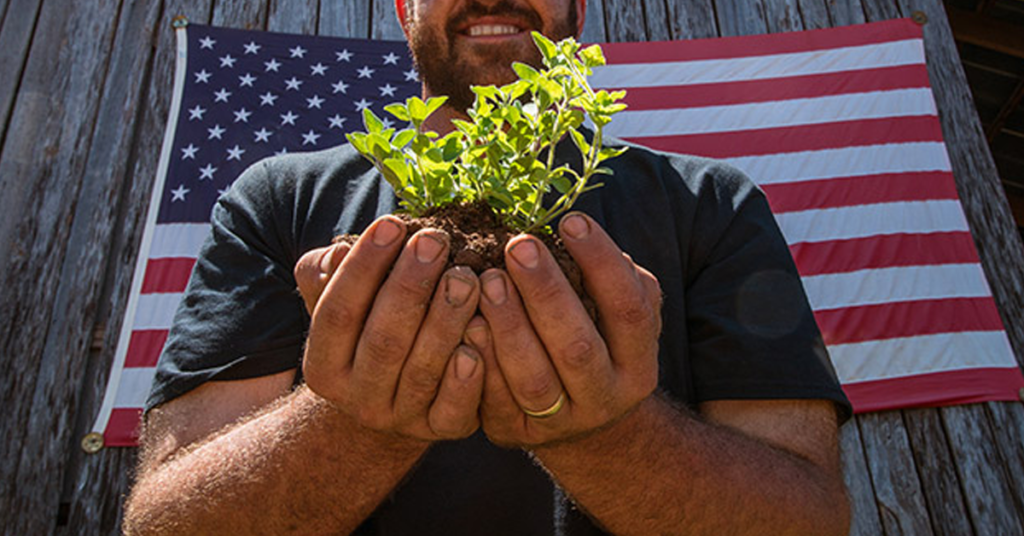
President Donald Trump continued to fill out key administration posts over the last week, including two positions that will have a significant impact on our district and state: Secretary of Agriculture and Secretary of Veterans Affairs. Former Georgia Governor Sonny Perdue has been nominated to serve as the next Secretary of Agriculture, which I believe is a strong selection that is good for Alabama. Agriculture is our state’s largest industry, and the policies carried out by the U.S. Department of Agriculture (USDA) affect Alabama farmers in meaningful ways. Gov. Perdue was raised on a farm and built his career working in the agriculture industry. As the former governor of neighboring Georgia, Gov. Perdue brings valuable understanding of Alabama-produced commodities from peanuts and cotton to poultry and forestry. He’s been a longtime friend to farmers, and a friend of farmers is a friend of mine. It won’t be long until Congress begins crafting a new farm bill. As we do, I’m eager to work with Gov. Perdue to ensure that USDA programs and services adequately address the needs of farmers and rural communities in Alabama. For Secretary of Veterans Affairs, President Trump has tapped Dr. David Shulkin, who currently serves as VA Under Secretary for Health. Some criticized this nomination because, as a current VA official, Dr. Shulkin isn’t viewed as the “outsider” that many expected from the Trump Administration. I understand these concerns, and certainly no one has been more vocal than me about the need to clean house at the VA. However, it is important to remember that Dr. Shulkin is relatively new. He came in from the private sector to replace those who were dismissed in the wake of the national wait time scandal, so it’s not fair to pin all of the problems on him. I have met with Dr. Shulkin in my office and worked with him on VA reform legislation. He is a physician with a great deal of experience managing a large health care network. I believe he truly wants to reform the system, and we owe it to him to give him a chance to lead. Alabama’s 2nd District has one of the highest concentration of veterans in the country. We’ve made significant progress improving the Central Alabama VA that serves our area, but much more work remains. It is important for me to have relationships with top VA officials so that we can turn their attention to problems in Alabama when action is needed. Cabinet posts like Agriculture and Veterans Affairs might not come with the same fanfare as more visible roles like Secretary of State or Secretary of Defense, but they are critical posts for issues impacting those I represent. I look forward to working with both Gov. Perdue and Dr. Shulkin for the benefit of Alabama farmers and veterans. ••• Martha Roby represents Alabama’s Second Congressional District. She lives in Montgomery, Alabama with her husband Riley and their two children.
USDA approves disaster aid for farmers in 25 Alabama counties
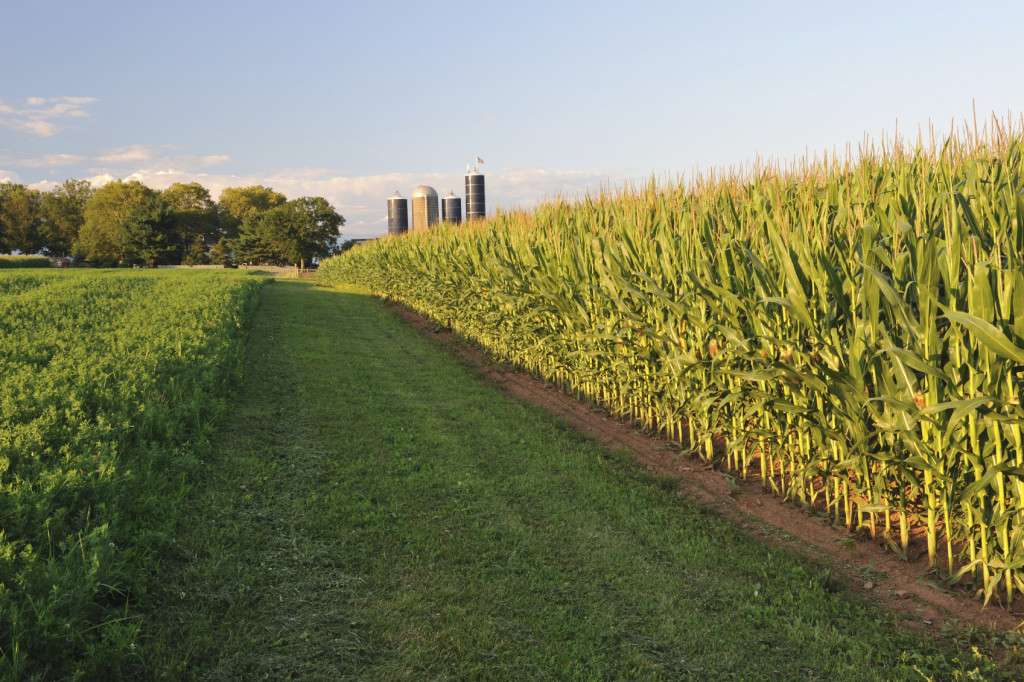
Farmers in 25 Alabama counties are eligible for emergency loans because of excessive rainfall, wind and flooding this year, Gov. Robert Bentley‘s office announced. The United States Department of Agriculture approved the counties for a Secretarial Natural Disaster Designation, allowing farmers to be considered for help from the USDA-Farm Service Agency. The severe weather caused extensive damage to many crops during the 2015 growing season, according to a news release from the governor’s office. Bentley sent a letter to Agriculture Secretary Thomas Vilsack on Nov. 12 asking for the assistance. Today, Vilsack formally designated 13 counties as primary natural disaster areas, as well as 12 contiguous counties. The counties are: Baldwin, Barbour, Butler, Bullock, Chambers, Coffee, Conecuh, Covington, Crenshaw, Dale, Elmore, Escambia, Geneva, Henry, Houston, Lee, Lowndes, Macon, Monroe, Montgomery, Pike, Randolph, Russell, Tallapoosa and Wilcox. Farmers in those counties have 8 months to apply for emergency loans. The applications will be evaluated individually based on direct production losses. Republished with permission of the Associated Press.


